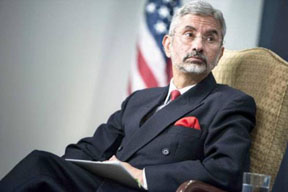 NEW DELHI: Suggesting a localized investment approach to Japan to yield better results, Foreign Secretary S Jaishankar today asked Japanese companies to have expectations that are grounded in the Indian reality.
NEW DELHI: Suggesting a localized investment approach to Japan to yield better results, Foreign Secretary S Jaishankar today asked Japanese companies to have expectations that are grounded in the Indian reality.
“India is India. I would not necessarily defend everything in India which goes right or wrong. But it is important for Japanese companies to understand that their expectations must be grounded in the Indian reality. Surely Indian reality can be improved.
“They (Japanese companies) should not expect that they will get responses that they have experienced in other geographies. I think a much more educated aware, localized investment approach perhaps would yield greater results in India,” Jaishankar said at a seminar organized by RIS.
His comments are significant given that Japanese companies like Suzuki Motors and Toyota have had labor-related unrest in past few years leading to temporary shutting down of Toyota plants near Bangalore as well as bitter fights between the management and employees.
Appreciating Japan’s contribution in India’s growth, Jaishankar said, “In India’s growth story, Japan has a very unique role. Japan is the one country, I would say has changed Indian mindset in different points of time.”
“I am not sure even today whether Japanese understand that what Maruti did to Indian mindset. Entire generation grew up with that change, then the next change was with metro rail project. Today we expect that High Speed Railway (HSR) project would emerge as the third phase of the changing mindset.”
Jaishankar also admitted that India has not been able to fully utilize the India-Japan Comprehensive Economic Partnership Agreement (CEPA), which was signed in 2011.
Referring to some Japanese projects, he said high speed railway (HSR) project and Civil Nuclear Agreement, if approved, clearly have potential to improve demand which will increase trade between the two countries.
Asserting that investment sentiments was much stronger today in India, the Foreign Secretary said, “We have gone out of way to make special carve-out for Japan including business visa arrangement which is unique. It is important that today we aggressively push investments.”
He also pointed out that the last five years have not been economically good, globally.
The bilateral trade between the countries stood at USD 14.51 billion in 2015-16. India received USD 20.96 billion FDI from Japan during April 2000 and March 2016.
Japanese ambassador in India Kenji Hiramatsu said that India-Japan CEPA was one of the most difficult bilateral trade negotiations for Japan.
“It took 14 rounds of negotiations to finalize the agreement. CEPA has become a strong symbol for India-Japan relationship,” Hiramatsu said at the event.
The ambassador noted that Japan-India social security agreement became operational from October 1.
Hiramatsu also said that Indian companies should set up offices in Japan as there are only few Indian companies which have done so.
Highlighting that Japan has identified 12 sites to set up industrial township in India, he said, “Japan is keen to see more reforms including land acquisition law, tax reforms so that investors can feel positive change in ease of doing business in India.” –PTI






